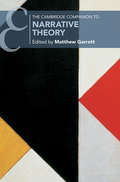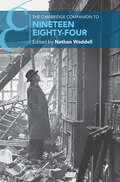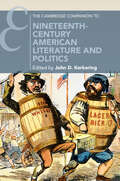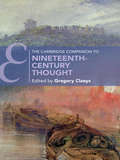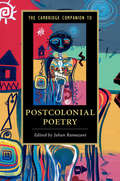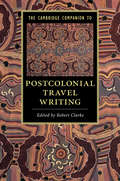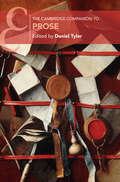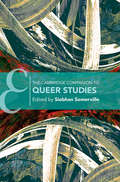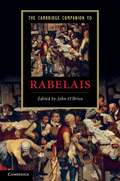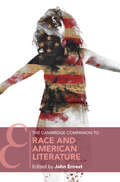- Table View
- List View
The Cambridge Companion to Narrative
by David HermanThe Cambridge Companion to Narrative provides a unique and valuable overview of current approaches to narrative study. An international team of experts explores ideas of storytelling and methods of narrative analysis as they have emerged across diverse traditions of inquiry and in connection with a variety of media, from film and television, to storytelling in the 'real-life' contexts of face-to-face interaction, to literary fiction. Each chapter presents a survey of scholarly approaches to topics such as character, dialogue, genre or language, shows how those approaches can be brought to bear on a relatively well-known illustrative example, and indicates directions for further research. Featuring a chapter reviewing definitions of narrative, a glossary of key terms and a comprehensive index, this is an essential resource for both students and scholars in many fields, including language and literature, composition and rhetoric, creative writing, jurisprudence, communication and media studies, and the social sciences.
The Cambridge Companion to Narrative Theory (Cambridge Companions to Literature)
by Matthew GarrettNarrative theory is essential to everything from history to lyric poetry, from novels to the latest Hollywood blockbuster. Narrative theory explores how stories work and how we make them work. This Companion is both an introduction and a contribution to the field. It presents narrative theory as an approach to understanding all kinds of cultural production: from literary texts to historiography, from film and videogames to philosophical discourse. It takes the long historical view, outlines essential concepts, and reflects on the way narrative forms connect with and rework social forms. The volume analyzes central premises, identifies narrative theory's feminist foundations, and elaborates its significance to queer theory and issues of race. The specially commissioned essays are exciting to read, uniting accessibility and rigor, traditional concerns with a renovated sense of the field as a whole, and analytical clarity with stylistic dash. Topical and substantial, The Cambridge Companion to Narrative Theory is an engaging resource on a key contemporary concept.
The Cambridge Companion to Nathaniel Hawthorne
by Richard H. MillingtonThe Cambridge Companion to Nathaniel Hawthorne, first published in 2004, offers students and teachers an introduction to Hawthorne's fiction and the lively debates that shape Hawthorne studies. In commissioned essays, twelve eminent scholars of American literature introduce readers to key issues in Hawthorne scholarship and deepen our understanding of Hawthorne's writing. Each of the major novels is treated in a separate chapter, while other essays explore Hawthorne's art in relation to a stimulating array of issues and approaches. The essays reveal how Hawthorne's work explores understandings of gender relations and sexuality, of childhood and selfhood, of politics and ethics, of history and modernity. An Introduction and a selected bibliography will help students and teachers understand how Hawthorne has been a crucial figure for each generation of readers of American literature.
The Cambridge Companion to Native American Literature
by Joy Porter Kenneth M. RoemerInvisible, marginal, expected - these words trace the path of recognition for American Indian literature written in English since the late eighteenth century. This Companion chronicles and celebrates that trajectory by defining relevant institutional, historical, cultural, and gender contexts, by outlining the variety of genres written since the 1770s, and also by focusing on significant authors who established a place for Native literature in literary canons in the 1970s (Momaday, Silko, Welch, Ortiz, Vizenor), achieved international recognition in the 1980s (Erdrich), and performance-celebrity status in the 1990s (Harjo and Alexie). In addition to the seventeen chapters written by respected experts - Native and non-Native; American, British and European scholars - the Companion includes bio-bibliographies of forty authors, maps, suggestions for further reading, and a timeline which details major works of Native American literature and mainstream American literature, as well as significant social, cultural and historical events. An essential overview of this powerful literature.
The Cambridge Companion to Nineteen Eighty-Four (Cambridge Companions to Literature)
by Nathan WaddellGeorge Orwell's Nineteen Eighty-Four (1949) remains a book of the moment. This Companion builds on successive waves of generational inheritance and debate in the novel's reception by asking new questions about how and why Nineteen Eighty-Four was written, what it means, and why it matters. Chapters on a selection of the novel's interpretative contexts, the literary histories from which it is inseparable, the urgent questions it raises, and the impact it has had on other kinds of media, ranging from radio to video games, open up the conversation in an expansive way. Established concerns (e.g. Orwell's attitude to the working class, his anxieties about the socio-political compartmentalization of the post-war world) are presented alongside newer ones (e.g. his views on evil, and the influence of Nineteen Eighty-Four on comics). Individual essays help us see in new ways how Orwell's most famous work continues to be a novel for our times.
The Cambridge Companion to Nineteenth-Century American Literature and Politics (Cambridge Companions to Literature)
by John D. KerkeringThe Cambridge Companion to Nineteenth-Century American Literature and Politics addresses the political contexts in which nineteenth-century American literature was conceived, consumed, and criticized. Individual chapters examine how US literature from this period engaged with broad political concepts and urgent political issues, such as liberalism, conservatism, radicalism, nationalism, communitarianism, sovereignty, religious liberty, partisanship and factionalism, slavery, segregation, immigration, territorial disputes, voting rights, gendered spheres, and urban/rural tensions. Chapters on literary genres and forms show how poetry, drama, fiction, oratory, and nonfiction participated in political debate. The volume's introduction situates these chapters in relation to two larger disciplines, the history of political thought and literary history. This Companion provides a valuable resource for students and instructors interested in Nineteenth-Century American literature and politics.
The Cambridge Companion to Nineteenth-Century American Poetry
by Kerry LarsonThis Companion is the first critical collection of its kind devoted solely to American poetry of the nineteenth century. It covers a wide variety of authors, many of whom are currently being rediscovered. A number of anthologies in the recent past have been devoted to the verse of groups such as Native Americans, African-Americans and women. This volume offers essays covering these groups as well as more familiar figures such as Dickinson, Whitman, Longfellow and Melville. The contents are divided between broad topics of concern such as the poetry of the Civil War or the development of the 'poetess' role and articles featuring specific authors such as Edgar Allan Poe or Sarah Piatt. In the past two decades a growing body of scholarship has been engaged in reconceptualizing and re-evaluating this largely neglected area of study in US literary history - this Companion reflects and advances this spirit of revisionism.
The Cambridge Companion to Nineteenth-Century American Women's Writing
by Dale M. Bauer Philip GouldProviding an overview of the history of writing by women in the period, this 2001 Companion establishes the context in which this writing emerged, and traces the origin of the terms which have traditionally defined the debate. It includes essays on topics of recent concern, such as women and war, erotic violence, the liberating and disciplinary effects of religion, and examines the work of a variety of women writers, including Harriet Beecher Stowe, Rebecca Harding Davis and Louisa May Alcott. The volume plots new directions for the study of American literary history, and provides several valuable tools for students, including a chronology of works and suggestions for further reading.
The Cambridge Companion to Nineteenth-Century Thought (Cambridge Companions to Literature)
by Gregory ClaeysThe nineteenth century was seemingly a period of great progress. Huge advancements and achievements were made in science, technology and industry that transformed life and work alike. But a growing pride in modernity and innovation was tainted by a sense of the loss of the past and the multiple threats which novelty posed. The Cambridge Companion to Nineteenth-Century Thought provides an impressive survey of the period's major ideas and trends. Leading scholars explore some of the most influential concepts and debates within philosophy, history, political thought, economics, religion and the social sciences, as well as feminism and imperialism. Some of these debates continued into the following century and many still remain relevant in the present day. This Companion is an excellent tool for readers seeking to understand the genesis of modern discourse across a range of humanities and social science subjects.
The Cambridge Companion to Old English Literature
by Malcolm Godden Michael LapidgeThis book introduces students to the literature of Anglo-Saxon England, the period from 600–1066, in a collection of fifteen specially commissioned essays. The Companion is aimed at students encountering Old English literature for the first time, who require clear guidance and orientation in an unfamiliar field. The first chapters describe briefly the political, social and ecclesiastical history of the period and how poetry and prose developed and flourished. A succinct account of Old English language provides beginners with a guide to grammar, syntax and vocabulary. Subsequent chapters explore such topics as Germanic legend and heroic ideals, paganism and fatalism, the cult of saints and responses to the Bible. Important prose texts, such as those by Bede, Alfred, Aelfric and Wulfstan, are covered under these thematic headings. Poems such as The Battle of Maldon, The Wanderer, The Seafarer and The Dream of the Rood, are discussed in detail, but in association with related texts, in prose as well as poetry. A separate chapter is devoted to Beowulf, but aspects of the poem are also discussed in other chapters. Finally a bibliography lists essential editions, reference works and critical studies.
The Cambridge Companion to Oscar Wilde
by Peter RabyThe Cambridge Companion to Oscar Wilde offers an essential introduction to one of the theatre's most important and enigmatic writers. Although a general overview, the volume also offers some of the latest thinking on the dramatist and his impact on the twentieth century. Part One places Wilde's work within the cultural and historical context of his time and includes an opening essay by Wilde's grandson, Merlin Holland. Further chapters also examine Wilde and the Victorians and his image as a Dandy. Part Two looks at Wilde's essential work as playwright and general writer, including his poetry, critiques, and fiction, and provides detailed analysis of such key works as Salome and The Importance of Being Earnest among others. The third group of essays examines the themes and factors which shaped Wilde's work and includes Wilde and his view of the Victorian woman, Wilde's sexual identities, and interpreting Wilde on stage. This 1997 volume also contains a detailed chronology of Wilde's work, a guide to further reading, and illustrations from important productions.
The Cambridge Companion to Ovid
by Philip HardieOvid was one of the greatest writers of classical antiquity, and arguably the single most influential ancient poet for post-classical literature and culture. In this Cambridge Companion, chapters by leading authorities from Europe and North America discuss the backgrounds and contexts for Ovid, the individual works, and his influence on later literature and art. Coverage of essential information is combined with exciting critical approaches. This Companion is designed both as an accessible handbook for the general reader who wishes to learn about Ovid, and as a series of stimulating essays for students of Latin poetry and of the classical tradition.
The Cambridge Companion to Piers Plowman
by Andrew Cole Andrew GallowayPiers Plowman has long been considered one of the greatest poems of medieval England. Current scholarship on this alliterative masterpiece looks very different from that available even a decade ago. New information about the manuscripts of the poem, new historical discoveries, and new investigations of its literary, cultural and theoretical scope have fundamentally altered the very meaning of Langland's art. This Companion thus critically surveys traditional scholarship, with the aim of recuperating its best insights, and it ventures forth into newer areas of inquiry attuned to questions of social setting, institutional context, intellectual and literary history, theory, and the revitalized fields of codicology and paleography. By proceeding through chapters that offer cumulatively wider views as well as stand-alone analyses of topics most crucial to understanding Piers Plowman, this Companion gives serious students and seasoned scholars alike up-to-date knowledge of this intricate and beautiful poem.
The Cambridge Companion to Popular Fiction
by David Glover Scott MccrackenPopular commercial fiction emerged in the nineteenth century, with serialised novels and sensational penny dreadfuls. Today it remains a multi-million dollar industry giving pleasure to many, but it is also a field of growing interest for scholars and students of literature. This Companion covers the major developments in the history of popular fiction, with specially commissioned chapters on pulp fiction, bestsellers, and comics and graphic narratives. The volume also examines the public and personal everyday contexts within which popular texts are read, highlighting the ways in which such narratives have circulated across a variety of constantly changing media, including theatre, television, cinema and new computer-based digital forms. Case studies from key genres – crime fiction, romance and Gothic horror – as well as a full chronology and guide to further reading make this collection indispensable to all those interested in this complex and vibrant cultural field.
The Cambridge Companion to Postcolonial Literary Studies
by Neil LazarusThe Cambridge Companion to Postcolonial Literary Studies offers a lucid introduction and overview of one of the most important strands in recent literary theory and cultural studies. The volume aims to introduce readers to key concepts, methods, theories, thematic concerns, and contemporary debates in the field. Drawing on a wide range of disciplines, contributors explain the impact of history, sociology and philosophy on the study of postcolonial literatures and cultures. Topics examined include everything from anti-colonial nationalism and decolonisation to globalisation, migration flows, and the â ~brain drain' which constitute the past and present of â ~the postcolonial condition'. The volume also pays attention to the sociological and ideological conditions surrounding the emergence of postcolonial literary studies as an academic field in the late 1970s and early 1980s. The Companion turns an authoritative, engaged and discriminating lens on postcolonial literary studies.
The Cambridge Companion to Postcolonial Poetry
by Jahan RamazaniThe Cambridge Companion to Postcolonial Poetry is the first collection of essays to explore postcolonial poetry through regional, historical, political, formal, textual, gender, and comparative approaches. The essays encompass a broad range of English-speakers from the Caribbean, Africa, South Asia, and the Pacific Islands; the former settler colonies, such as Canada, Australia, and New Zealand, especially non-Europeans; Ireland, Britain's oldest colony; and postcolonial Britain itself, particularly black and Asian immigrants and their descendants. The comparative essays analyze poetry from across the postcolonial anglophone world in relation to postcolonialism and modernism, fixed and free forms, experimentation, oral performance and creole languages, protest poetry, the poetic mapping of urban and rural spaces, poetic embodiments of sexuality and gender, poetry and publishing history, and poetry's response to, and reimagining of, globalization. Strengthening the place of poetry in postcolonial studies, this Companion also contributes to the globalization of poetry studies.
The Cambridge Companion to Postcolonial Travel Writing
by Robert ClarkeThe Cambridge Companion to Postcolonial Travel Writing offers readers an insight into the scope and range of perspectives that one encounters in this field of writing. Encompassing a diverse range of texts and styles, performances and forms, postcolonial travel writing recounts journeys undertaken through places, cultures, and communities that are simultaneously living within, through, and after colonialism in its various guises. The Companion is organized into three parts. Part I, 'Departures', addresses key theoretical issues, topics, and themes. Part II, 'Performances', examines a range of conventional and emerging travel performances and styles in postcolonial travel writing. Part III, 'Peripheries' continues to shift the analysis of travel writing from the traditional focus on Eurocentric contexts. This Companion provides a comprehensive overview of developments in the field, appealing to students and teachers of travel writing and postcolonial studies.
The Cambridge Companion to Postmodern American Fiction
by Paula GeyhFew previous periods in the history of American literature could rival the richness of the postmodern era - the diversity of its authors, the complexity of its ideas and visions, and the multiplicity of its subjects and forms. This volume offers an authoritative, comprehensive, and accessible guide to the American fiction of this remarkable period. It traces the development of postmodern American fiction over the past half-century and explores its key aesthetic, cultural, and political contexts. It examines its principal styles and genres, from the early experiments with metafiction to the most recent developments, such as the graphic novel and digital fiction, and offers concise, compelling readings of many of its major works. An indispensable resource for students, scholars, and the general reader, the Companion both highlights the extraordinary achievements of postmodern American fiction and provides illuminating critical frameworks for understanding it.
The Cambridge Companion to Prose (Cambridge Companions to Literature)
by Daniel TylerThis Companion provides an introduction to the craft of prose. It considers the technical aspects of style that contribute to the art of prose, examining the constituent parts of prose through a widening lens, from the smallest details of punctuation and wording to style more broadly conceived. The book is concerned not only with prose fiction but with creative non-fiction, a growing area of interest for readers and aspiring writers. Written by internationally-renowned critics, novelists and biographers, the essays provide readers and writers with ways of understanding the workings of prose. They are exemplary of good critical practice, pleasurable reading for their own sake, and both informative and inspirational for practising writers. The Cambridge Companion to Prose will serve as a key resource for students of English literature and of creative writing.
The Cambridge Companion to Proust
by Richard BalesThe Cambridge Companion to Proust provides a broad account of the major features of Marcel Proust's great work A la recherche du temps perdu (1913-1927). The specially commissioned essays, by acknowledged experts on Proust, address a wide range of issues relating to his work. Progressing from background and biographical material, the chapters investigate such essential areas as the composition of the novel, its social dimension, the language in which it is couched, its intellectual parameters and its humor.
The Cambridge Companion to Pushkin
by Andrew KahnAlexander Pushkin stands in a unique position as the founding father of Russian literature. In this Companion, leading scholars discuss Pushkin's work in its political, literary, social and intellectual contexts. In the first part of the book individual chapters analyse his poetry, his theatrical works, his narrative poetry and historical writings. The second section explains and samples Pushkin's impact on broader Russian culture by looking at his enduring legacy in music and film from his own day to the present. Special attention is given to the reinvention of Pushkin as a cultural icon during the Soviet period. No other volume available brings together such a range of material and such comprehensive coverage of all Pushkin's major and minor writings. The contributions represent state-of-the-art scholarship that is innovative and accessible, and are complemented by a chronology and a guide to further reading.
The Cambridge Companion to Queer Studies (Cambridge Companions to Literature)
by Siobhan B. SomervilleThis Companion provides a guide to queer inquiry in literary and cultural studies. The essays represent new and emerging areas, including transgender studies, indigenous studies, disability studies, queer of color critique, performance studies, and studies of digital culture. Rather than being organized around a set of literary texts defined by a particular theme, literary movement, or demographic, this volume foregrounds a queer critical approach that moves across a wide array of literary traditions, genres, historical periods, national contexts, and media. This book traces the intellectual and political emergence of queer studies, addresses relevant critical debates in the field, provides an overview of queer approaches to genres, and explains how queer approaches have transformed understandings of key concepts in multiple fields.
The Cambridge Companion to Rabelais
by John O'BrienThe Franciscan monk, humanist and physician Fran ois Rabelais, who flourished in sixteenth-century France, is widely considered as the Renaissance's greatest comic writer. His work - including most notably Gargantua and Pantagruel - continues to enthral readers with its complex and delicately crafted humour. 'Rabelaisian' and 'Gargantuan' have entered the lexicon but are often misunderstood; this Companion explains the literary and historical reality behind these notions. It provides an accessible account of Rabelais' major works and the contextual information and conceptual tools needed to understand the author and his world. The most up-to-date book on Rabelais to be designed specifically for English-speaking audiences, the Companion is intended to enable a broad spectrum of readers both to appreciate and to enjoy Rabelais. With a detailed guide to further reading and a chronology, and with all quotations given in translation, this is an ideal guide for students and scholars of French and comparative literature.
The Cambridge Companion to Race and American Literature (Cambridge Companions to Literature)
by John ErnestRace is central to American history. It is impossible to understand the United States without understanding how race has been defined and deployed at every stage of the nation's history. Offering a comprehensive and accessible introduction to the history of race, The Cambridge Companion to Race and American Literature shows how this history has been represented in literature, and how those representations have influenced American culture. Written by leading scholars in in African American, Latinx, Asian American, Native American, and white American studies, the essays in this volume address the centrality of race in American literature by foregrounding the conflicts across different traditions and different modes of interpretation. This volume explores the unsteady foundations of American literary history, examines the hardening of racial fault lines throughout the nineteenth century and into the twentieth, and then considers various aspects of the multiple literary and complexly interrelated traditions that emerged from this fractured cultural landscape.
The Cambridge Companion to Ralph Ellison
by Ross PosnockRalph Ellison's classic 1952 novel Invisible Man is one of the most important and controversial novels in the American canon and remains widely read and studied. This Companion provides the most up-to-date introduction to this influential and significant novelist and critic and to his masterpiece. It features newly commissioned essays, a chronology and a guide to further reading. The essays reveal new dimensions of Ellison's art radiating out from Invisible Man into new domains - technology, political theory, law, photography, music, religion - and recover the compelling urgency and relevance of Ellison's political and artistic vision. Since Ellison's death his published oeuvre has been expanded by several major volumes - his collected essays, the fragment of a novel, Juneteenth (1999), letters and short stories - examined here in the context of his life and work. Students and scholars of Ellison and of American and African-American literature will find this an invaluable and accessible guide.

